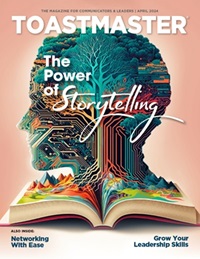Do you want to move on to new speeches in your manual but feel you have nothing to offer? The top-rated speakers have either gone through a harrowing experience to emerge on the sunny side, or they have a rags-to-riches story to share. They are so inspiring! But your life is normal—what on earth could you share that others don’t already know? How can you create a seven-minute speech that will hook and hold the audience?
The following brainstorming techniques will help you discover ways to turn your “normal” into knockout speeches.
Expand on your Ice Breaker
The first, and sometimes most difficult, speech in Toastmasters is the Ice Breaker. It’s all about you. You might condense decades of interesting events into this one short presentation. Personal experiences are often the backbone of a successful speech, so expand on one of your own experiences and use it to inform or inspire.
In my Ice Breaker, I recalled how my parents named me after the film they saw on their first date: Rose Marie—a 1954 remake of a musical my mother had loved when she was younger. They had considered going to see Godzilla: King of the Monsters!, but they opted for the other film. In my speech I joked that my life would have been far different had I been named after Godzilla.
So if I were brainstorming speech subjects, I could revisit that story and come up with a couple of topics. One possibility: What’s in a name? How does your name shape your life or behavior? This topic could easily get listeners thinking about the origins of their own names, which lends itself to audience participation. The next time I brainstorm, I might consider a speech that revolves around my name.
Another potential topic: classic films and their impact on our lives. How has the big screen affected your outlook on life? Share a film or television program that impacted you in a meaningful way.
Take a walk
A 2014 study conducted by Stanford University suggests that a person’s creative output increases by an average of 60 percent while walking. Many bosses hold “walking meetings.” Walking, or even pacing, can clear your mind. You’re more receptive to ideas. It helps you look at your surroundings in a different way.
Expand on one of your experiences and use it to inform or inspire.
For example, you may walk past children playing at a park and remember your own schoolyard friendships or adversaries. As another example, let’s pretend you stop at a hot dog cart and buy a dog with everything. You may get the idea to speak about the history of the hot dog: Who invented the hot dog (or ketchup? Or mustard?) Or consider mobile food and how food carts played a part in the growth of a fast food nation.
Use random online searches
Using your favorite online search engine, type in two or three unrelated words. (You can open a book or a magazine and randomly select a few words.) I tried “sailing” and “peanuts.” My search revealed a video of Charles Schulz’ Peanuts gang singing the Styx song “Come Sail Away.” That could lead to music-related topics. Is music your passion? Does a particular song spark a memory? Do you prefer to listen to music at work?
If your original search doesn’t spark any ideas, click on a link, and then another. You may come across a different topic that intrigues you. In my case, a few clicks led to a five-minute TED Talk by a young inventor, Ashton Cofer, who helped develop a process for converting Styrofoam waste into a filter for purifying water.
You could come up with several speech topics from these two videos, including:
- Does music help you produce? How music helps or hinders productivity in the workplace.
- Trash for good: You don’t have to be a scientist to make a difference in the world.
Start with a quote or a famous saying
Inspire others by sharing one of your favorite quotes or sayings and telling a story that reflects the message. Consider this quote from the late American baseball player Yogi Berra: “I really didn’t say everything I said.” That could lead into a speech about how to avoid being misquoted.
If a good speech topic doesn’t come to mind during one of your brainstorming sessions, don’t feel you have failed. Topic ideas can take time to evolve—to emerge from the foggy mist of your mind. Write down all the possibilities that emerge from your brainstorming sessions—even if initially they don’t resonate with you. Come back to them, reverse them or twist their original meaning into something your audience can appreciate and relate to. And have fun in the process!
Rosie Wolf Williams, CC is a writer, voice artist and member of the Toastmasters of Greater Burlington club in South Burlington, Vermont.


 Previous
Previous
 Previous Article
Previous Article